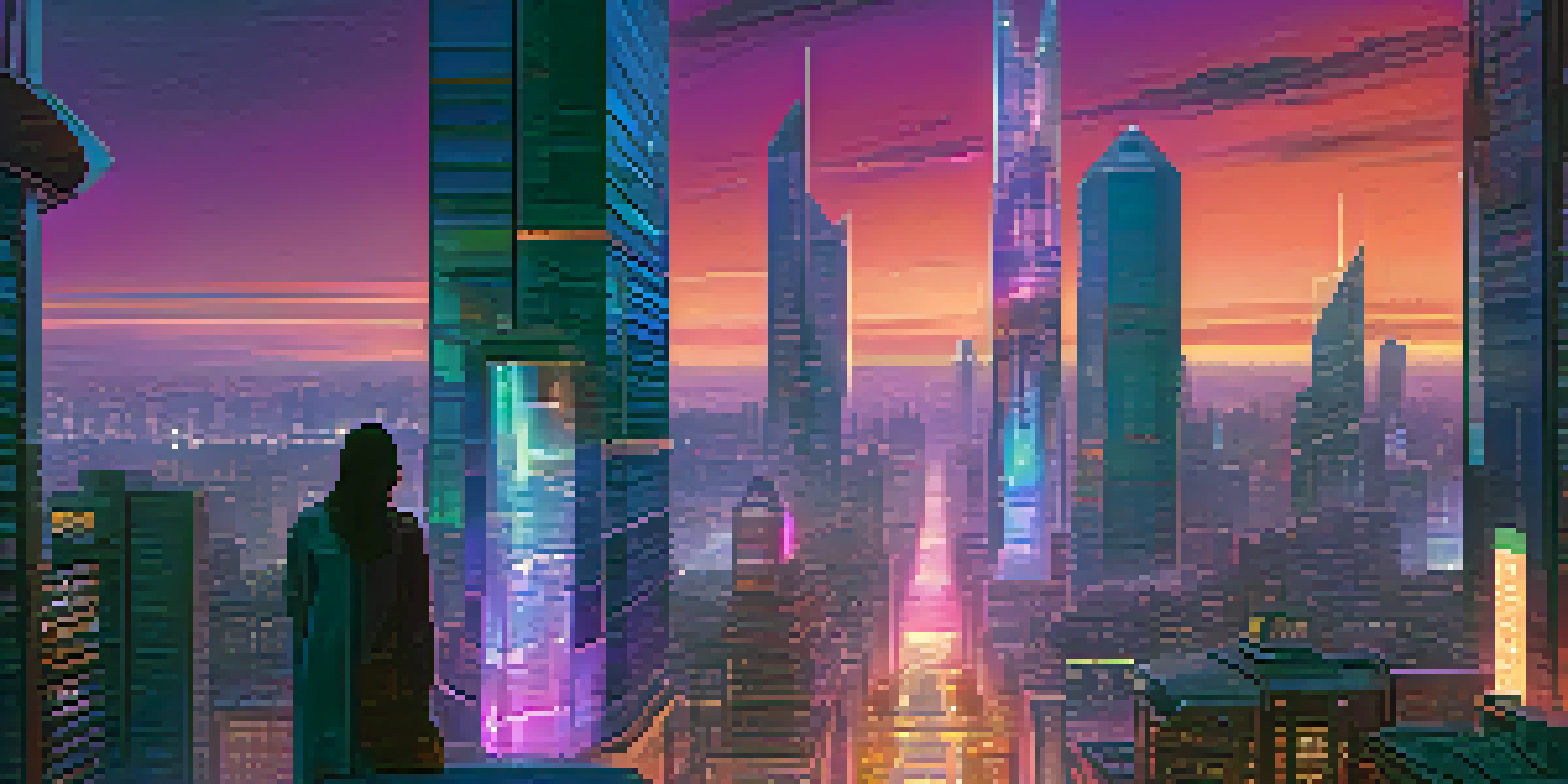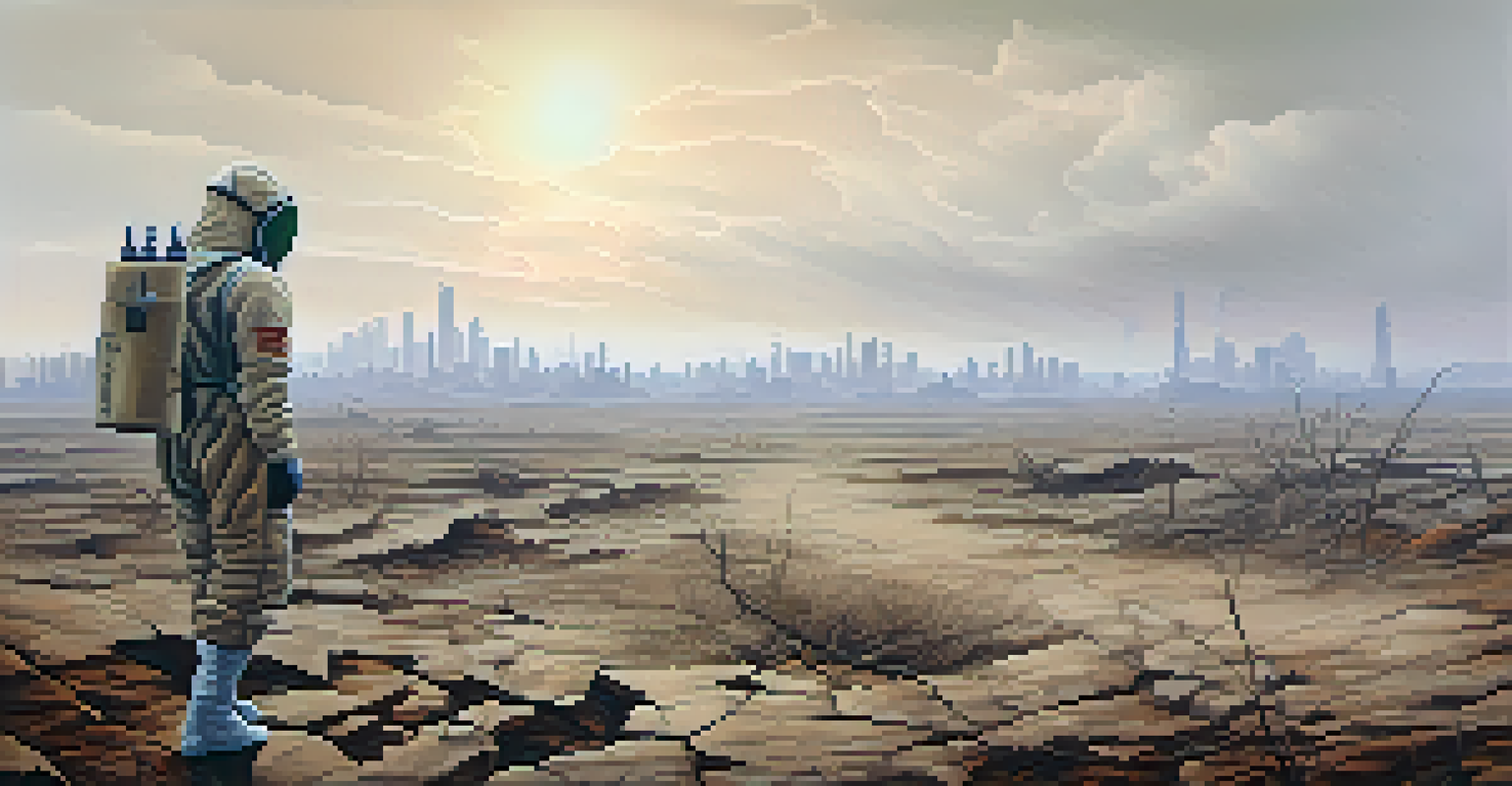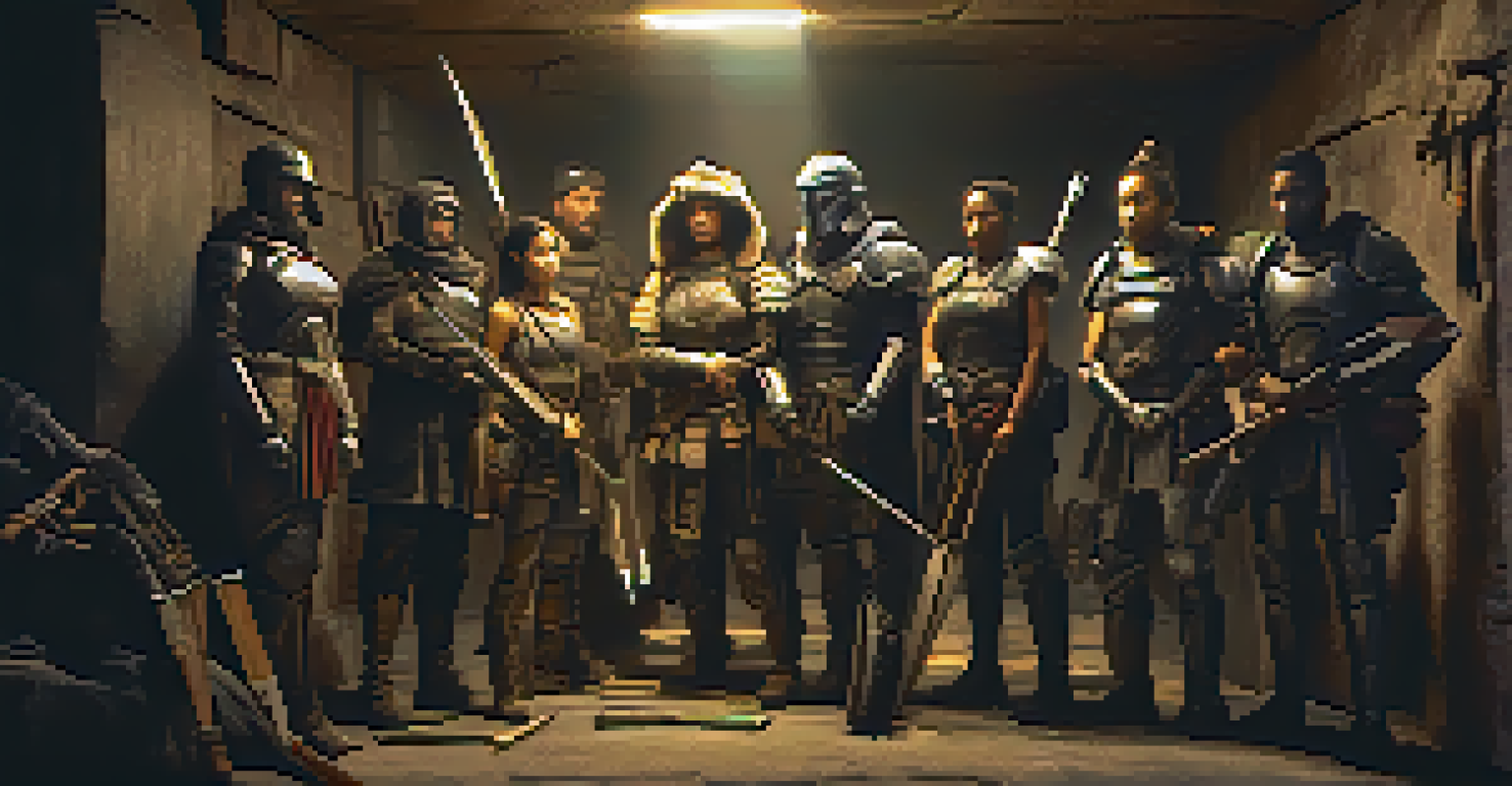Dystopian Futures: How Films Reflect Technological Fears

Defining Dystopia: A Glimpse into the Future
Dystopia, often portrayed in films, represents an imagined world where society is flawed, typically due to oppressive governments or technological advances gone wrong. These narratives serve as cautionary tales, reflecting our anxieties about the future. Movies like 'Blade Runner' and 'The Matrix' illustrate how technology, instead of liberating us, can entrap or dehumanize. By exploring these dystopian worlds, filmmakers tap into our deepest fears of what the future might hold.
The future is already here — it's just not very evenly distributed.
The concept of dystopia isn’t new; it has roots in literature, but film brings these visions to life with vivid imagery and sound. This medium allows audiences to experience the emotional weight of a dystopian society firsthand. As we watch these films, we're confronted with uncomfortable questions about our current trajectory. Are we heading towards a future that mirrors these cinematic nightmares?
Ultimately, these dystopian films challenge us to reflect on our values and the choices we make today. They force us to consider not just the technology we create, but the ethical implications that come with it. As we dive deeper into this genre, we can uncover the layers of meaning behind the frightful scenarios presented on screen.
Technological Anxiety: The Root of Dystopian Narratives
At the heart of many dystopian films lies a profound fear of technology. This anxiety often stems from the rapid pace of technological advancement, which can leave society feeling out of control. Films like 'Black Mirror' intricately weave stories that highlight the potential consequences of our technological obsessions, prompting viewers to reconsider their relationship with devices and digital life. These narratives often reflect real-world concerns about privacy, surveillance, and the impact of social media.

Moreover, the portrayal of technology in dystopian cinema often raises ethical dilemmas. For instance, 'Ex Machina' explores the implications of artificial intelligence and the moral responsibilities of its creators. Such films invite us to ponder, what happens when our creations surpass our understanding? This question resonates deeply in today’s increasingly tech-driven world, making these films particularly relevant.
Dystopia Reflects Our Fears
Dystopian films serve as cautionary tales, mirroring our anxieties about technology, government control, and societal choices.
By examining these narratives, audiences can gain insight into their own fears and the societal implications of unchecked technological growth. Dystopian films serve as mirrors, reflecting our anxieties back at us and urging a critical dialogue about the path we’re on. In doing so, they remind us that the future is not predetermined; it is shaped by the choices we make today.
The Role of Government and Control in Dystopian Films
Many dystopian films explore the theme of government control and its impact on individual freedoms. Films like 'V for Vendetta' and 'The Hunger Games' illustrate how authoritarian regimes can manipulate technology to maintain power and suppress dissent. These narratives compel viewers to consider the balance between security and personal liberty, especially in a world where technology can be used to surveil and control populations.
We are all in the gutter, but some of us are looking at the stars.
Such portrayals can often serve as a critique of current political climates, encouraging audiences to question the extent to which they trust their governments. The fear of losing autonomy in the face of overwhelming control resonates with many viewers, making these films particularly poignant. The characters in these stories often find themselves in a battle against the system, embodying the struggle for freedom in a technologically advanced society.
The tension between individual rights and governmental authority presents a powerful commentary on contemporary issues, such as data privacy and civil liberties. As we navigate our increasingly digital lives, these films remind us of the importance of vigilance in protecting our freedoms. They challenge us to remain aware of how technology can be both a tool for empowerment and a weapon of oppression.
Artificial Intelligence: The Double-Edged Sword
Artificial intelligence (AI) is a recurring theme in dystopian cinema, often depicted as both a potential savior and a dire threat. Movies like 'I, Robot' and 'Her' delve into the complexities of human-AI relationships, showcasing both the benefits and dangers of this technology. On one hand, AI can enhance our lives and solve complex problems; on the other, it raises questions about autonomy and the essence of what it means to be human.
The anxiety surrounding AI often centers on its potential to surpass human intelligence and the ethical implications that arise from that scenario. Films like 'Transcendence' highlight fears of loss of control and the consequences of merging human consciousness with machines. These narratives compel viewers to confront the uncomfortable truth that as we push the boundaries of technology, we may also be inviting unforeseen risks.
Technology: A Double-Edged Sword
While technology offers potential benefits, dystopian narratives highlight the ethical dilemmas and risks associated with its unchecked growth.
Dystopian films about AI serve as a crucial reminder of the need for ethical considerations in technology development. They encourage us to engage in conversations about the direction of AI research and its impact on society. Ultimately, by reflecting on these narratives, we can better understand the delicate balance between innovation and caution in our technological pursuits.
Social Isolation and Alienation in a Tech-Driven World
Dystopian films often depict a world where technology, instead of fostering connection, leads to profound social isolation. Movies like 'Ready Player One' portray virtual reality as an escape from a bleak reality, highlighting how technology can create a false sense of community. This theme resonates with audiences in an age where social media often replaces genuine human interactions, prompting us to reflect on our own experiences of connection.
These narratives illustrate the irony of a hyper-connected world that can leave individuals feeling more isolated than ever. Characters in these films frequently struggle with loneliness, even amidst technological advancements designed to bring people together. This contrast raises essential questions about the impact of technology on our mental health and social relationships.
By exploring the theme of isolation, dystopian films encourage viewers to reconsider the role of technology in their lives. They challenge us to prioritize authentic connections and seek out meaningful interactions, even in an increasingly digital landscape. Ultimately, these stories serve as a poignant reminder that while technology can enhance our lives, it should never replace the value of human relationships.
Environmental Catastrophes: A Common Dystopian Theme
Environmental degradation is a frequent backdrop in many dystopian narratives, serving as a stark warning about the consequences of neglecting our planet. Films like 'Snowpiercer' and 'Mad Max: Fury Road' depict worlds ravaged by climate change, showcasing the dire outcomes of humanity’s disregard for the environment. These portrayals resonate deeply as they mirror ongoing real-world concerns about pollution, resource depletion, and climate crises.
The depiction of environmental collapse in these films often highlights the disparity between the powerful and the vulnerable. Characters must navigate a harsh reality where survival hinges on access to dwindling resources, prompting reflections on social justice and inequality. This connection encourages audiences to consider the broader implications of environmental policies and our collective responsibility to protect the planet.
Hope Amidst Dystopian Struggles
Despite the bleakness of dystopian settings, these films often emphasize themes of resistance and hope, inspiring viewers to believe in the possibility of change.
By confronting the harsh realities of environmental destruction, dystopian films serve as a call to action. They inspire viewers to engage in environmental advocacy and consider their role in creating a sustainable future. In doing so, these narratives empower us to envision a world where technology and nature coexist harmoniously, rather than in conflict.
Hope and Resistance: Finding Light in Dystopian Darkness
Despite the bleak settings of many dystopian films, themes of hope and resistance often emerge as powerful counterpoints. Characters who rise against oppression, like in 'The Hunger Games' and 'Children of Men,' embody the resilience of the human spirit. These narratives remind us that even in the darkest of times, there is always the potential for change and redemption.
The journey of these protagonists often serves as a metaphor for our own struggles against societal challenges. Their fights against overwhelming odds resonate with audiences, inspiring us to take action in our own lives. These stories encourage us to believe in the possibility of a better future, even when faced with daunting obstacles.

Ultimately, dystopian films can instill a sense of agency in viewers, motivating us to challenge the status quo. They remind us that while technology and society may present formidable challenges, it is our choices and actions that can shape the future. In this way, these films not only reflect our fears but also empower us to imagine and strive for a more hopeful tomorrow.